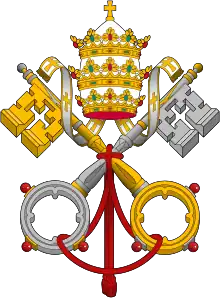Goldrofe of Arganil | |
|---|---|
.png.webp) Gothic image of Saint Goldrofe in the Monastery of Folques, in Arganil | |
| Prior | |
| Born | 11th century AD |
| Died | 4 February, c. 1100 Arganil, County of Portugal |
| Canonized | 1170, by Miguel Pais Salomão, Bishop of Coimbra (Cultus confirmed by Pope Pius VI c. 1791[1]) |
| Major shrine | Monastery of Folques |
| Feast | 4 February[2] |
Tradition or genre | Augustinians |
Goldrofe of Arganil, C.R.S.A. (Portuguese: São Goldrofe or Goldofre, alternatively, Golfredo or Guelindrofe; fl. 1086) was a Portuguese Augustinian prior in what is today central Portugal. He is venerated as a saint in the Roman Catholic Church.
Life
Very little is known about the life of Goldrofe. He served as the first prior of the Monastery of Saint Peter, in Arganil; the earliest documental evidence of both the monastery and Goldrofe dates to 1086, when nobleman Vermudo Pais (Vermudus Paes) and his wife Elvira Draíz left their properties in Folques in their will to Goldrofe and his religious community ("Sancto viro Goldrofo priori de Arganil, et Clericis ejus Religiosis").[3] The Monastery of Saint Peter would be transferred in 1190, after Goldrofe's death, to these lands,[4] where it remains to this day.
Legacy
_-_Andr%C3%A9_Gon%C3%A7alves_(Miseric%C3%B3rdia_de_Coimbra).png.webp)
Goldrofe died around 1100, with a reputation for sanctity; after miraculous cures soon after started to be attributed to his intercession, he began to be invoked against malignant fevers and other ailments. Goldrofe was canonised in 1170 by Miguel Pais Salomão, Bishop of Coimbra, when Salomão himself was instantly healed from a grave malady that had afflicted him after praying with great devotion over Goldrofe's grave; at the time, bishops had the authority to canonise faithful people in their dioceses.[4]
In 1190, when the Monastery of Saint Peter was transferred from Arganil to Folques, the remains of Goldrofe were exhumed for reburial at the new building. The body was found to be incorrupt and exuding the odour of sanctity. The remains were put in a wooden coffin and laid under the main altar of the monastery; by the request of the Prior and Canons of the Monastery, Bishop Martinho Gonçalves had one of Goldrofe's shinbones removed and exposed for public veneration as a relic — it became a popular devotion to use this relic to bless water to give the sick.[4]
Following the reforms of Pope Urban VIII on the process of beatification and canonisation (Sanctissimus Dominus Noster, 1625 and Caelestis Hierusalem cives, 1634), Bishop-Count Miguel da Anunciação opened a formal inquiry onto the canonisation of Goldrofe in 1758, which was only concluded in 1791; the documents are kept in Torre do Tombo National Archive, in Lisbon.[5]
References
- ↑ Cid, Augusto (1 July 1947). "Arganil (séc. XVIII) : um desconhecido processo respeitante a S. Goldrofe (parte XIX)" [Arganil (18th century): a forgotten inquest pertaining to Saint Goldrofe (part XIX)] (PDF). A Comarca de Arganil (in Portuguese). Vol. 47, no. 3356. Arganil. p. 3. Retrieved 15 November 2020, through the Hemeroteca do Concelho de Arganil
{{cite magazine}}: External link in|postscript= - ↑ Cardoso, Jorge (1666). Agiologio lusitano dos sanctos, e varoens illustres em virtude do Reino de Portugal, e suas conquistas [Lusitanian hagiology, of the saints and men illustrious in their virtue from the Kingdom of Portugal] (in Portuguese). Vol. Volume 1. Lisbon: Officina de António Craesbeeck de Mello. p. 341.
- ↑ Encarnação, Tomás da (1760). Historia Ecclesiæ Lusitanæ [History of the Lusitanian Church] (in Latin). Vol. Volume II. Coimbra: Ex Prælo Academiæ Pontificiæ. pp. 244–245.
- 1 2 3 Santa Maria, Nicolau de (1668). "Do Veneravel Padre, & Santo Prior do Mosteiro de Folques D. Goldofre, & de alguns seus successores no Priorado (Livro VIII, Capítulo XVII)". Chronica da Ordem dos Conegos Regrantes do Patriarcha S. Agostinho [Chronicle of the Order of the Canons Regular of the Patriarch Saint Augustine] (in Portuguese). Vol. Volume II. Lisboa: Officina de Joam da Costa. pp. 159–161.
- ↑ "Fundo "Mosteiro de São Pedro de Folques (1155–1812)": Livro do processo de beatificação e canonização de São Goldrofe". Torre do Tombo National Archive. Retrieved 14 November 2020.
